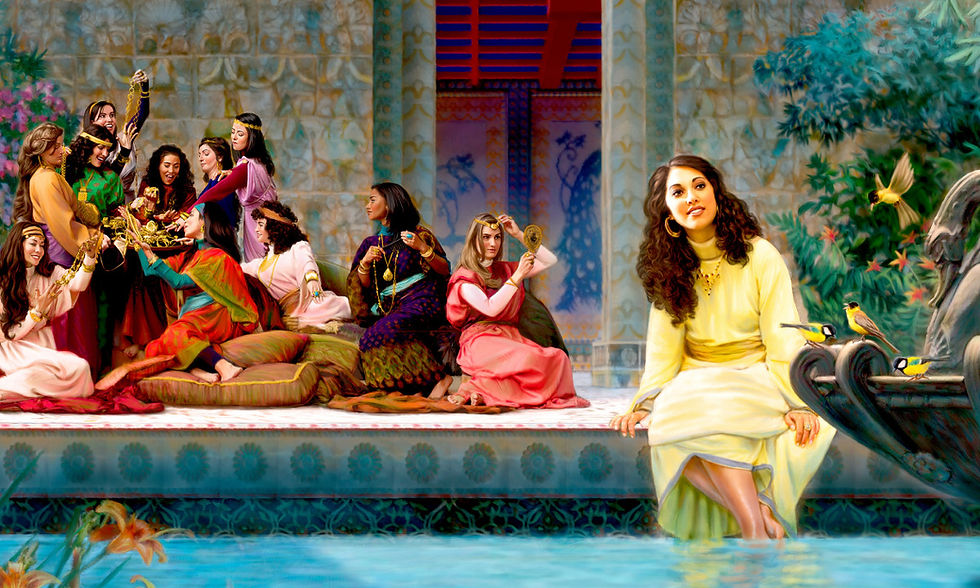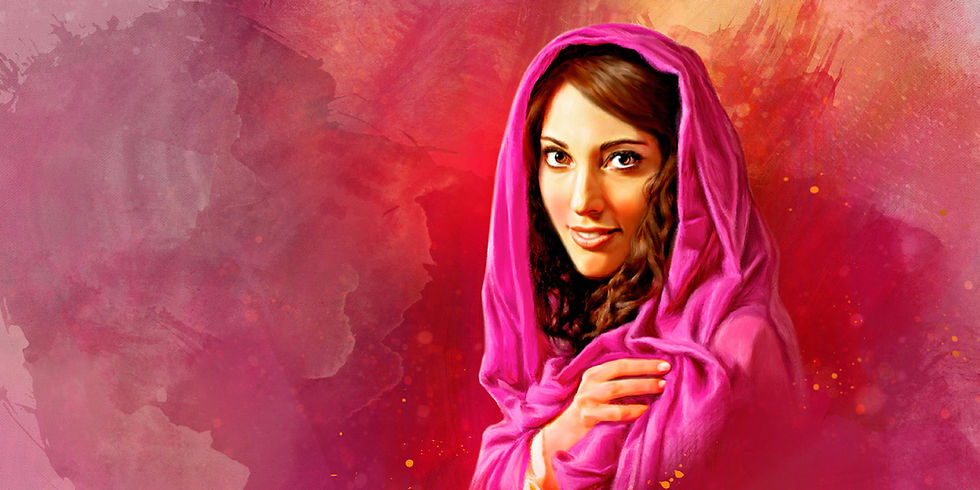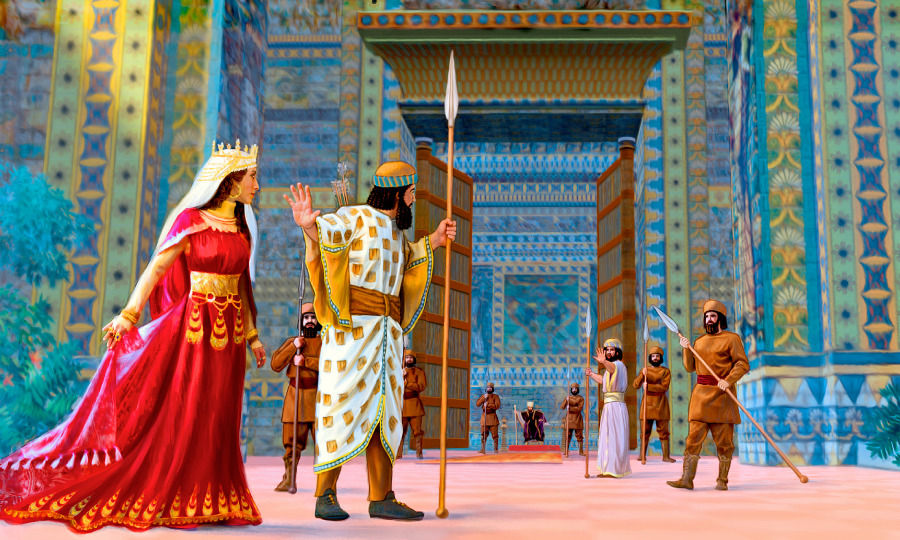Shalom girls! I hope and pray this post finds you all well as you all strive to serve the Lord and follow Him through thick and thin.
In the last post I said I'd try to write a post about Esther, since we recently celebrated the feast of Purim. And, the heroine of the story is someone I'm sure many of us look up to and admire.

Esther, or Hadassah, whichever name you prefer to call her by, is such an inspiring character and one I think we can learn a lot from. As daughters and young ladies, Esther is someone we can really relate to a bit more than the male heroes in the Bible. When I was younger, I used to get frustrated that there we mostly men who accomplished great things in the Bible and that the women did not appear all that interesting.
But as I've gotten a little older, I've come to realize that although the women didn't come with the dramatic stories that usually accompanied the men, it doesn't mean they were weak-kneed or unimportant. The Bible teaches us women that we aren't supposed to be ''out there'' with trumpets blaring before us and trying to prove to the guys that we're just as cool as they are or better. We are equally important members in the body of Messiah and we all have extremely important roles to play. But we're gloriously different, and thus God designed our job description to fit that marvelous purpose. Yes, sometimes it seems like our roles ought to be reversed - but it's always harder to do the right thing, isn't it? But that's what we were called to do; not to do the easy thing, but the right thing.
And that brings us back to Esther's story.
I listened to something about Esther, and I found it encouraging and thought I'd try to sum it up as best as I can for all of you. I will attach the link to the full video I watched at the end of this blog post if you want to look into more of the details, but I'm going to try keep it short for your sakes!
When you look at the story of Esther and Purim, it actually has similar parallels with Moses and the Exodus story. Esther and Moses are similar characters - both have fractured identities. They're kind of part of the royal family but their people are outside suffering under the hands of the royal family they are supposed to belong to, and facing all sorts of hardship and struggle and evil decrees. It's a mental and emotional struggle for both Moses and Esther. Where do they really belong?

Also, both of them had to go and face the kings of the time on behalf of their people at great danger to themselves. They both hesitate and are afraid to rise to the call. But in the end, they do go. The people in the book of Esther took the mitzvah of Purim upon themselves just like the people of Israel took the Torah on themselves at Mount Sinai, and when the Israelites left Egypt some of the Egyptians joined themselves to the people of Israel, and some of the Gentiles also joined themselves to the Jewish people in the book of Esther. Whenever God is honored and glorified through His people, more people join themselves to Him. The Bible also says that the first redemption will be like the last redemption, and so, I personally think we can learn a lot about how to act in these last days from the book of Esther, just like from the story of Exodus, and find lots of encouragement for our time.
The major difference between the two stories is that Moses gets a command straight from the Lord, confirmation that everything is going to be okay, and guidance straight from the Lord. Esther goes on a Moses-like mission without any signs or promises whatsoever. She doesn't even know if her mission is going to be successful.
Throughout the Bible, we get to meet many women who are saviours. A common thread between them all is that none of them are ever commanded to be saviours, none of them get promised that everything is going to be okay, and none of them get the signs. There are many male saviours but they always get called on by the Lord to help the Jewish people and they are always given this promise that the Lord will be with them.
The women saviours don't get these kinds of promises. Think about the Hebrew midwives, Miriam watching over baby Moses, Pharaoh's daughter, Zipporah, Rahab, Yael, Abigail, Michal, the list goes on and on. They all came and acted with no promises about the outcome. What stands out to me is that they did the right thing and followed the righteous path because that's what it is - the right thing. They used whatever they had at their disposal. It wasn't fancy of elegant. It was humble and they used what God had given them to do what was right, thereby saving God's people. We're not these weak creatures that have no minds of our own. We're obedient to the Lord, and when we need to act, we do so modestly.

So, when you look at Esther, you can kind of see that she's following a well travelled and marked out path of godly women. Look at what Mordechai tells Esther, ''If you don't save the Jewish people, salvation will come from another place.'' The overall outcome for God's people is going to be okay. Esther, you want to be a part of it. You should be a part of it. It reminded me of the times we are in. The Kingdom of God is coming; it is at the door! It may seem that we aren't going to make it through, but we will. We have the choice to give in to fear and ultimately lose the prize, or we can say yes to the unthinkable and walk into the world of miracles and complete victory over our enemies. God's people will triumph, but we need to take action and establish righteousness in the area God has given us. We need bold faith even when it feels like God is hiding His face from us. He is not hiding His face from us (in the book of Esther God is not mention, but it is obvious that He was there all along). He is waiting for us to do the right thing even though it seems dark around us. Even if the circumstances seem to make it impossible. The first redemption will be like the last redemption. Light will come and we will see His hand in it all.
Esther's reply was not a faith filled ''Yes sir, God is great, here I go! Everything is going to be okay and amazing. I'm on it!'' Instead she says, ''If I perish, I perish.'' She emphasizes that she has no idea what the outcome is going to be, but it is the right thing to do and therefore I am going to do it. We might not know what the outcome is going to be in our own personal lives, but God promises to give us strength to do what is right. We are called to be a light to those around us, and we can only shine that light when we do what the Lord commands us. ''Let there be light'', God said to a world filled with darkness. Let us be encouraged to shine like the stars, for the Son will shine on us. (The name 'Esther' means 'star' in Persian. It also means 'hidden'. I found that really amazing)
Esther is showing us the path of the Biblical, female heroine. It's a willingness to do what's right with unreasonable faith from and internal compass guided by the Word of God, without having received any commandment and no sound and light show that the male saviours have. The female saviours in the Bible do what is right with no knowledge of how things are going to turn out. I find that encouraging, and a motivation to grow my faith and love for the Lord. He's got this. If I perish, I perish. He's only good and will do what is good.
Esther is the perfect, classical submissive female in the first half of the book. She does what she's told and follows the rules. She's a pretty uninteresting character. She's so uninteresting that when you look at her response to Mordechai when he comes to the king's court in sackcloth and ashes her first response is not '' Oh no, he's wearing sackcloth! Bring him other clothes!'' What a fashion police! She's upset that his clothes are not looking right. She's not following the path of the other female saviours.

But when you look at the second half of the book she's just unbelievable! She doesn't just beg for her people like Mordechai told her to. She makes this multi-faceted plan, a fast plan, a prayer plan, a practical plan... wow! She's pin-pointing all the layers. And after she is successful in executing her plan she goes to the king and makes a plan for how the Jews will avenge their enemies and issues a command to forever commemorate this day. What? How does she go from orphan Esther to Queen Esther the heroine?
We can track her transformation by looking at her conversation with Mordechai. He tells her to go and beg. He tells her that she has to go beg for the Jewish people. And what does she say? ''Oo the rules! I wish I could but he hasn't called me for 30 days and if I go without being called upon I might get killed! I'm really sorry I'm really scared.'' She's staying in her law-abiding position. ''I follow rules. I'm just doing what I'm told.''
Mordechai's response is shocking. He doesn't give her this pet talk of ''It's okay, you can do this! Everything is going to be fine, don't worry at all.'' He tells her, ''Don't imagine that you will be able to hide from the destiny of the Jewish people by being in the palace.'' Hang on a second, she never said anything about hiding from the destiny of the Jews. He's pointing something out that went like a dagger to her heart. He says, ''I'm listening to your fears and I know you're afraid. But what I'm hearing is, 'I think this is not going to effect me. I think that if I just stay in the castle and hide my identity and keep my head down I'll be okay. Everything will be okay for me. This is not a me problem.''' That's what Mordechai is hearing. And when he says that to her she really has to come to face with the truth of her motivations. Am I just being a good girl because that's the right thing to do, or am I using my fears and dual personality as an excuse for not doing what I know I need to do?
Mordechai is telling her that she's only thinking about herself and not the Jewish people (what a good reminded that we are to put our lot with the Jewish people like Ruth, not because it's easy, but because it's right!). He's telling her that she's not really looking outside herself to the Lord in order to do what is right, he's telling her that she's doing what's easy. This reminded me of the Christians who kept silent during the Holocaust. May we do what is right in our days!

Esther takes on this responsibility. She doesn't know if it's all going to be okay. ''If I perish, I perish.'' She offers herself up for the Jewish people. She offers herself up completely and walks into God's servant with a humble, ''Here I am. Use me.'' She plans and does the best she can. The results? Well, that's up to God. She is willing to look death in the eye in an unbelievable act of courage. She is trusting the Lord for the outcome. If I die, at least I die doing the right thing.
When she starts drawing from an internal strength, when she starts relying and acting on God's strength, that's when her entire character changes. I thought that was very encouraging. It's when we dig deeper and draw strength from His Word and press in through prayer with a heart like a child holding her father's hand that we ourselves change. It doesn't happen in a day. But if we keep going in His encouragement we will get there!
And just like the female saviours before her, Esther's methods weren't elegant. She used what she had. She didn't wait for something ''wow'' to execute her plan. She used what she had been given. What an amazing thing to learn! We don't need fancy gadgets or anything like that. We need to learn to use what we've been given, isn't it? Too often we think that we need something else in order to accomplish things. Esther and the other women are showing us that that's not true. Learn to use what you have and to be happy and thankful for it. It's the most fulfilling life, especially for us women. We have a tendency to complain and grumble about our lot. Esther is teaching us the better way, the way of true fulfillment. Gratefulness and thankfulness and using what we've been given - wow, if only we could grasp the enormity of the impact that would have!
Esther's story is really preparing us for what a life with a quiet relationship with the Lord looks like. God sometimes speaks to us quietly, internally. She's showing us what a 'hidden' relationship with the Lord is like and how to exist in such a relationship with Him.
The female heroine is the one who teaches us to see the good with faith even though there isn't any promise of the outcome you want. It is rather knowing that we are going to walk up the path of goodness and positivity and faith and be a strength of lifting up the people around us no matter what.

I guess what I really got from Purim this year is that we are called to be a light and shine hope to the world in which we are. God doesn't always seem ''obvious'' and sometimes He is hidden from our view. It's so easy to see that. The enemies of the Lord will not overcome Him or His people. We just need to have the faith to walk in courage and follow the Lord. We need to cling to Him and shine His love to the world. He will strengthen us!
I hope you were all encouraged! Esther's story is such an inspiring one and one that can have a lot more written about it. Perhaps, Lord willing, we can look into Esther's story more and draw more encouragement either later on this year or next Purim.
And yes, I have noticed that this blog post is very long. But we only read the Book of Esther once a year, so I think I can justify myself in that it's a must to dedicate so much time to studying such an amazing woman of God!
May you all have a very blessed time prepping for Passover! God bless you all xxx
''Walk as children of light.'' Ephesians 5:8
''You are the light of the world. A city set on a hill cannot be hidden. Neither do people light a lamp and put it under a basket... In the same way, let your light shine before men so they may see your good works and glorify your Father in heaven.'' Matthew 5:14-16
''Now when these signs happen to you, do for yourself what the occasion requires, for God is with you.'' 1 Samuel 10:7
''I pray that from His glorious riches He would grant you to be strengthened in your inner being with power through His Ruach, so that Messiah may dwell in your hearts through faith. I pray that you, being rooted and grounded in love, may have strength to grasp with all the kedoshim what is the width and length and height and depth, and to know the love of Messiah which surpasses knowledge, so you may be filled up with all the fullness of God.'' Ephesians 3:16-19
*I found all these paintings online.

留言